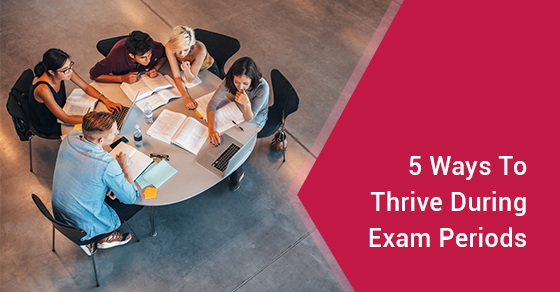


The exam season is usually a stressful period that can lead to students focusing entirely on their studies while disregarding their health. Even upper-level students who have sat for dozens of exams before have a tendency to go a little crazy, get grumpy, and definitely get off the tracks in terms of healthy eating and exercise. For anyone with exams approaching, these tips can help to fuel the brain and optimize health during the exam period.
You obviously want to dedicate more time to studying than preparing your meals, and you may even justify your unhealthy eating habits—surviving on burgers, coffee, pizza, and other unhealthy takeaways—as ‘treats’ for working so hard. However, these items contain very few nutrients and actually slow you down, making it harder for you to focus.
If you have access to home cooked meals, like when you’re living with your parents, or access to a cafeteria, you can take quick breaks to have healthy meals. Alternatively, you can share shopping and cooking duties with your housemates who also have exams, or cook double or triple portions so you can reheat what you need and reduce your cooking frequency by at least half. In addition to getting a balanced diet, follow the tips below.
Many people don’t mind studying till late into the night for a couple of weeks to pass an exam. It is a small compromise for weeks and months of laxity in the classroom. However, getting enough rest is critical for maintaining optimal brain function.
Pick a time at which you want to go to bed, and then give yourself at least one hour before bedtime to relax and unwind. Have a bath, check your social media, watch some YouTube videos, or do anything else other than studying or working to help you unwind. You shouldn’t have any problems falling asleep because your mind will already be exhausted, though doing some exercise during the day will probably help you to fall asleep faster.
During the exam period, it is tempting to skip your usual exercise activities in order to maintain your energy and give you more study time. However, scientists argue that exercise is beneficial for brain activity as it promotes blood flow around the body, including in the brain. Considering that exercising can help people avoid dementia, it is clear that a little workout can actually be helpful during exams.
Try to do a few activities each day, like walking, cycling, jogging, climbing stairs, or anything else to promote blood flow and to help your body and mind relax. Exercise can also re-energize you if you’re having a hard time concentrating.
You’re probably thinking that you’ll have plenty of time to catch up with your family and friends after your exams. Additionally, your peers, who will also be focusing on their exams, will likely be as unsociable as you. So why bother?
If you’re an outdoorsy person, locking yourself up to study for extended periods can prove to be quite a struggle. A quick break from your studies to play darts or laugh with friends at the pub can be enough to fuel you the next day or two. Joining a group study session is another way to benefit from human interaction while polishing up on your weak areas with the assistance of your peers.
It can be hard to stay calm and relaxed during exam time, but a little stress is not necessarily bad if it forces you to focus. Too much stress, however, can have the opposite effect, making it hard to concentrate and study. The following tips for keeping exam stress under control should help.
Final Note
Looking after yourself during study time and exam time by getting proper nutrition, exercising, socializing, and managing stress is very important. It will reduce exam preparedness pressure and make everything a little easier.